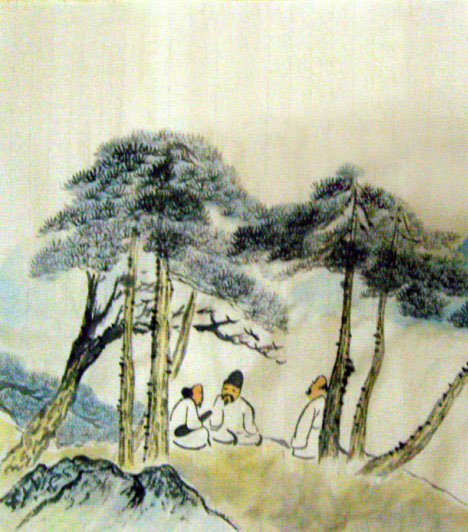| Meditative group dialogue is meditation in communication. We question, look, and investigate together whatever comes up. It is a meeting together as free from hierarchy and roles as possible rather then a question and answer period between beginners and experienced meditators. We give each other and ourselves lots of space, lots of time, and lots of silence so that we have a good opportunity to watch our own reactions, understand our conditioning and not too easily slip into the thinking intellect or emotional drama.
One of the most important aspects of group dialogue is to listen. We listen to the words, to the silence, and to that which is beyond words and silence. Other important aspects are honesty and personal relevance. By not pretending I give myself a chance to discover my own truths and others to discover theirs. By being personally relevant, that which is seen becomes something that concerns and is for real rather than a discussion on the content of ideas and images. In order to give room for the space to be personal it is important that what is shared in the group dialogue stays in the group so that the group can be held in a spirit of trust and confidentiality. |
 |
Group dialogue is not therapy. We do not try to change each other or tell each other what would and should not be done. There is of course a therapeutic effect in discovering ones hindrances and seeing the clearly enough to stop being a victim of them but the purpose of group dialogue is not therapy but to listen, see and explore together.
Group dialogue is not an exchange of opinions, a debate or a discussion. By observing our own reactions, thoughts, opinions, values, prejudices, emotions etc. we can learn something about ourselves and about being human. We can share this and look into this together from a perspective of open exploration instead of trying to convince someone else about our point of of view.
Group dialogue is not primarily a sharing of experiences or stories. If those comes up and helps to shed light on what the group inquires into together there is of course no problem but can we be aware that telling of experiences and stories easily lead into a sharing of memories? Can we be here together this moment instead? Look at what is actually going on here and now? Is it possible to allow what is really present here to surface and express it? Maybe something one wrestles with right now or something your caught a glimpse on during the sitting before the dialogue that you would want to look closer at together with the others?
You can also participate in silence, watching your own reaction on what is being expressed. Your silent attention contributes to the energy level of the entire group. We can also help each other by asking questions such as “what do you mean by that?”, “can you please elaborate?” and similar. By asking questions we helt the speaker to go deeper and find hidden motives or to see it clearer. When a question is put to the group or to oneself, is it possible to give yourself a little time to be with it for a little while and not be in such a hurry to respond that the answer comes out of reactive conditioning? Do you feel attacked or challenged when someone asks such a question? If so, is it possible to observer it? What is it? Who is being attacked or challenged?
 |
The essence of group dialogue is to meet and help each other to open up and reveal nuances of this wonderful and unfathomable experience of being. |